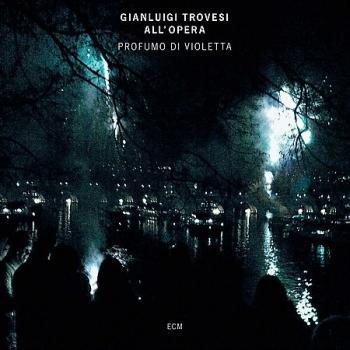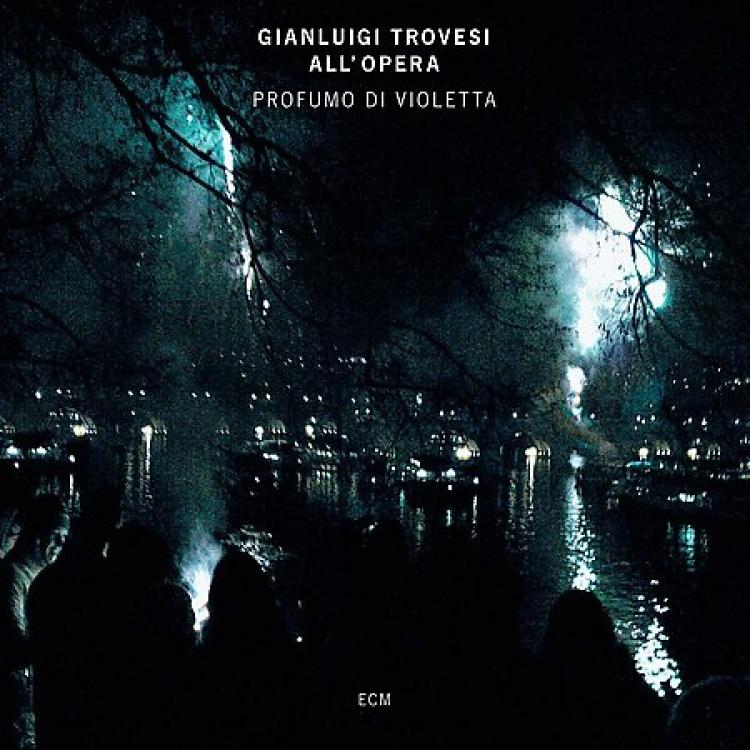Hollywood has an enduring ethnic stereotype of Italian men as frustrated opera singers. Though a caricature, there is undeniably a greater knowledge of the music throughout all levels of Italian society, due to the “banda” tradition of local brass and woodwind ensembles specializing in such operatic fare.
It was in such an organization that Italian reedman Gianluigi Trovesi began his musical career when his local banda lost its clarinetist. Now an established ECM recording artist, Trovesi pays homage to his banda roots and its operatic repertoire in All’Opera.
Recorded with the Filarmonica Mousike Orchestra, a contemporary banda ensemble, Trovesi’s approach is best described in terms of a mosaic, juxtaposing themes from instantly recognizable operas with his own succinct compositions—some derived from classical sources, others entirely original. The result is a kind of quilt of banda musical patches, conveying the spirit of traditional Italian music while remaining true to the jazz idiom.
Some of Trovesi’s originals essentially function as table-setters, like the opening fanfare of “Alba,” which segues nicely into the similarly textured “Toccata,” adapted from Monteverdi’s L’Orfeo. Three Orpheus-inspired originals follow, including the sensitive ballad “Euridice,” which proves a perfect vehicle for Trovesi’s rich contra-alto clarinet sound, concluding with a return to the original Monteverdi in a brief thumbnail of the “Ritornello.”
While the music of All’Opera is highly structured (as one would expect given the size of the orchestra backing Trovesi), many of the selections have an infectious swing. Seventeenth-century composer Maurizio Cazzati might not be widely interpreted today, but Trovesi’s arrangement (with Corrado Guarino and Christina Plihar) of “Intrecciar Ciaccone,” based on Cazzati’s “Ciaccona,” has an overtly jazz vibe vigorously propelled by drummer Stefano Bertoli. Echoes of “Ciaccone” are then later heard in Trovesi’s equally swinging original “Vespone.”
As with L’Orfeo, Trovesi’s treatment of “La Traviata” mixes extracts of Verdi with originals, including the leader’s two-part “Profumo di Violetta.” Marco Remondini’s electronically distorted cello also provides distinctive aural colors to his “Violetta a le alter” without overwhelming the overall Verdi suite. However, as the lead voice on “largo al factotum” from Rossini’s Barber of Seville, the intense wah-wah cello effects do stick out conspicuously.
While Trovesi plays some alto and piccolo (the latter heard to great effect on the playful miniature “Stizzoso, Mio Stizzoso,” based on Pergolesi’s The Servant Mistress), he largely opts for the clarinet on All’Opera, the instrument that first brought him into the sphere of banda music.
Although far from a household name in America, Trovesi is one of Italy’s top improvising musicians, who deserves the sort of international recognition his fellow countryman and label-mate Enrico Rava has achieved. His last ECM release, Vaghissimo Ritratto, made my 2007 top ten list, and All’Opera is recommended with much the same enthusiasm.
Joe Bendel blogs on jazz and cultural issues at http://jbspins.blogspot.com [^] and coordinated the Jazz Foundation of America’s instrument donation campaign for musicians displaced by Hurricane Katrina.
It was in such an organization that Italian reedman Gianluigi Trovesi began his musical career when his local banda lost its clarinetist. Now an established ECM recording artist, Trovesi pays homage to his banda roots and its operatic repertoire in All’Opera.
Recorded with the Filarmonica Mousike Orchestra, a contemporary banda ensemble, Trovesi’s approach is best described in terms of a mosaic, juxtaposing themes from instantly recognizable operas with his own succinct compositions—some derived from classical sources, others entirely original. The result is a kind of quilt of banda musical patches, conveying the spirit of traditional Italian music while remaining true to the jazz idiom.
Some of Trovesi’s originals essentially function as table-setters, like the opening fanfare of “Alba,” which segues nicely into the similarly textured “Toccata,” adapted from Monteverdi’s L’Orfeo. Three Orpheus-inspired originals follow, including the sensitive ballad “Euridice,” which proves a perfect vehicle for Trovesi’s rich contra-alto clarinet sound, concluding with a return to the original Monteverdi in a brief thumbnail of the “Ritornello.”
While the music of All’Opera is highly structured (as one would expect given the size of the orchestra backing Trovesi), many of the selections have an infectious swing. Seventeenth-century composer Maurizio Cazzati might not be widely interpreted today, but Trovesi’s arrangement (with Corrado Guarino and Christina Plihar) of “Intrecciar Ciaccone,” based on Cazzati’s “Ciaccona,” has an overtly jazz vibe vigorously propelled by drummer Stefano Bertoli. Echoes of “Ciaccone” are then later heard in Trovesi’s equally swinging original “Vespone.”
As with L’Orfeo, Trovesi’s treatment of “La Traviata” mixes extracts of Verdi with originals, including the leader’s two-part “Profumo di Violetta.” Marco Remondini’s electronically distorted cello also provides distinctive aural colors to his “Violetta a le alter” without overwhelming the overall Verdi suite. However, as the lead voice on “largo al factotum” from Rossini’s Barber of Seville, the intense wah-wah cello effects do stick out conspicuously.
While Trovesi plays some alto and piccolo (the latter heard to great effect on the playful miniature “Stizzoso, Mio Stizzoso,” based on Pergolesi’s The Servant Mistress), he largely opts for the clarinet on All’Opera, the instrument that first brought him into the sphere of banda music.
Although far from a household name in America, Trovesi is one of Italy’s top improvising musicians, who deserves the sort of international recognition his fellow countryman and label-mate Enrico Rava has achieved. His last ECM release, Vaghissimo Ritratto, made my 2007 top ten list, and All’Opera is recommended with much the same enthusiasm.
Joe Bendel blogs on jazz and cultural issues at http://jbspins.blogspot.com [^] and coordinated the Jazz Foundation of America’s instrument donation campaign for musicians displaced by Hurricane Katrina.







